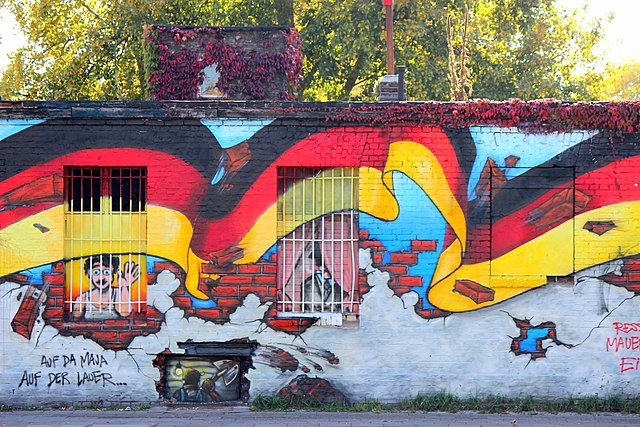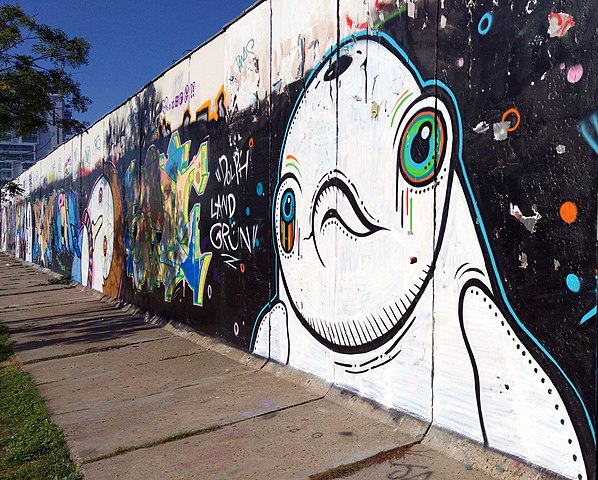
On Wednesday 28 August 2019 from 5pm to 8pm, a movie workshop on the fall of the Berlin Wall will be held at the Rewat Buddhinan Auditorium on the U2 level of the Pridi Banomtong Library, Tha Prachan campus. The film seminar will be hosted by the German-Southeast Asian Center of Excellence for Public Policy and Good Governance (CPG) at the Faculty of Law of Thammasat University.
The event will include the screening of The Lives of Others, a German film released as Das Leben der Anderen in 2006, about the monitoring of East Berlin residents in the 1980s by agents of the Stasi, the secret police of the East Germany, officially the German Democratic Republic (GDR). As the CPG website notes, the film portrays
a surveillance state on German soil and raises questions on the abuse of power by the state that are still, and increasingly, relevant today. The seminar will feature an introduction to the film and the wider topic before the screening. Subsequently, participants are invited to participate in discussions.
Students and other members of the TU community are welcome to register to attend at this link.
A major feature of the film is the Berlin Wall, or Berliner Mauer in German language, a guarded concrete barrier that divided the city of Berlin, Germany from 1961 to 1989. Building of the Wall began by the GDR in 1961, separating West Berlin from East Germany, including East Berlin. The barrier included guard towers placed along large concrete walls.
The TU Library owns a number of books about the Berlin Wall, for students interested in history, political science, and related fields.
They include The Berlin Wall by Deane and David Heller and Berlin Wall Art by Heinz J. Kuzdas and Michael Nungesser, both available for loan at the Pridi Banomyong Library; European Security Since the Fall of the Berlin Wall edited by Frederic Merand, Martial Foucault, and Bastien Irondelle at the Professor Direk Jayanama Library, Faculty of Political Science, Tha Prachan campus; and Management in Transitional Economies: from the Berlin Wall to the Great Wall of China by Malcolm Warner at the Puey Ungphakorn Library, Rangsit campus.

TU students may have noticed last year when the Bangkok-based graffiti artist Danaiphat ‘Mue Bon’ Lersputtitrakan displayed a mural showing bird characters on the right of two segments of the original Berlin Wall exhibited at the German Embassy in Bangkok on Sathon Road, Khwaeng Thung Maha Mek, Khet Sathon, Krung Thep Maha Nakhon.
As part of a street art festival, artists from Thailand, France and Germany decorated the two segments of the Berlin Wall. Visitors were briefly permitted to see the portions of the Wall before the exhibit was removed. In 2017, other fragments of the Wall were displayed in Jakarta, Indonesia.
In 2014, to commemorate the 25th anniversary of the fall of the Berlin Wall in 1989, the German Embassy in Thailand presented 25 Years of Freedom — The Fall of the Berlin Wall and the Transformation of Central Europe, an exhibition at the Bangkok Art and Culture Centre (BACC).
On that occasion the film The Lives Of Others was also screened, as well as two other German films relevant to the subject, Good Bye, Lenin! (2003) and The Divided Heaven (1964).

Further Inspirational Themes
As an extension of the importance of keeping walls from separating people because of ideological disagreements, last year the Falling Walls Lab Thailand competition was launched for innovative ideas in the Kingdom. Outstanding researchers, entrepreneurs and professionals were invited to present projects. Undergraduates, graduate students, and post-graduates as well as junior ajarns and entrepreneurs were asked to offer new research projects, initiatives, ideas and business models. Also last year, the Falling Walls Lab Finale was held in Berlin in addition to a Falling Walls Conference.
The purpose was to foster scientific and entrepreneurial innovations and to promote exchange between outstanding scholars and professionals in different fields of expertise.
Falling Walls Lab Thailand took place in September 2018 at Siam Innovation District at Siam Square One, Rama I Rd, Khwaeng Pathum Wan, Khet Pathum Wan, Krung Thep Maha Nakhon. It was hosted by the Friedrich Naumann Foundation for Freedom with support from the German Academic Exchange Service (DAAD), King Mongkut’s University of Technology (KMUTT) Thonburi, KMUTT Hatch University Business Incubator, Chulalongkorn University, EURAXESS ASEAN, the German-Thai Chamber of Commerce, KX (Knowledge Exchange) MADE, and others.
This year’s Falling Walls Lab Thailand will take place on 8 September 2019 at Compass SkyView Hotel Sukhumvit 24, Bangkok.
More cinema experience
Also last year, TU students who enjoy films may have noticed that the Goethe-Institut Thailand at Khwaeng Thung Maha Mek, Khet Sathon, Krung Thep Maha Nakhon featured a workshop and movie screening around the theme of Independent media production: Life in West Berlin in the 1980s, with the Berlin Wall playing a major role in the proceedings.
Some novels shave been written about the Berlin Wall, including John le Carré’s The Spy Who Came in from the Cold (1963) and Len Deighton’s Berlin Game (1983). They are available from the TU Library Interlibrary Loan (ILL) service.
Some memorable observations about the Berlin Wall include:
Walls in the mind often stand longer than those built of concrete.
- Willy Brandt, Governing Mayor of West Berlin and later Chancellor of the Federal Republic of Germany (West Germany), awarded the Nobel Peace Prize for his efforts to strengthen cooperation in western Europe through the EEC and to achieve reconciliation between West Germany and the countries of Eastern Europe.
Freedom has many difficulties and democracy is not perfect, but we have never had to put a wall up to keep our people in, to prevent them from leaving us.
- US President John F. Kennedy, during a speech in Berlin in June 1963. In the same landmark speech, President Kennedy also predicted that the wall would be torn down one day and Germany would reunite, when democracy would spread throughout Eastern Europe.
The Wall certainly ought not to be a permanent feature of the European landscape. I see no reason why the Soviet Union should think it is—it is to their advantage in any way to leave there that monument to communist failure.
- Dean Rusk, United States Secretary of State
 rewat
rewat
(All images courtesy of Wikimedia Commons)
